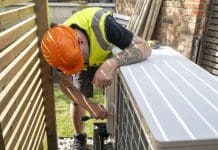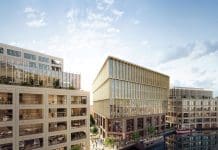Momentum for sustainable buildings is building rapidly, but how will the UK’s property and construction sector tackle all the challenges that lie ahead in completely decarbonising the built environment? Karl Desai, senior adviser for Advancing Net Zero at the UK Green Building Council, takes a look
The UK government’s 2050 net-zero carbon target, corporate ESG drivers and increased occupier interest are just three reasons why the buildings sector is waking up to the fact that net-zero carbon buildings are now a commercial priority. Market forces are pivoting to embrace business models that operate in line with climate science – and exposing those that don’t. Historically, it was considered hard to make a commercial case for sustainable buildings, but this thinking is now considered outdated with evidence of brown discounts being applied to inefficient buildings and green premiums secured by high-performing, low carbon buildings.
Advancing Net Zero
The UK Green Building Council’s (UKGBC) Advancing Net Zero (ANZ) programme is helping to lead the UK’s transition to net-zero by supporting the buildings sector to deliver the emissions reductions required to reach our climate goals. Since its inception in 2018, the programme has produced key resources to enable the uptake of net-zero carbon buildings. This includes last year’s seminal Net Zero Carbon Buildings Framework, which provides the industry with clarity on the outcomes required for a net-zero carbon building; the ongoing recruitment of signatories to the Net Zero Carbon Buildings Commitment to catalyse business action; and, most recently, a feasibility study examining the design, delivery and cost of new net-zero carbon buildings.
UKGBC is an industry-led network with over 450 members, so all ANZ projects aim to provide consensus-driven and practically applicable resources that help build consistency across the entire value chain. The resources are freely available and continually being developed to remain responsive to the sector’s needs.
Additionally, UKGBC works closely with other industry bodies that are helping to build the knowledge bank of net-zero resources. This includes the Royal Institute of British Architects (RIBA), the London Energy Transformation Initiative (LETI) and the Chartered Institution of Building Services Engineers (CIBSE), among many others.
The ANZ programme has been made possible thanks to the generous support of our lead partner, the Redevco Foundation, and our programme partners BAM Construct UK, Berkeley Group, Grosvenor Britain & Ireland, Hoare Lea and JLL UK.
Cost and delivery implications of net-zero
Research earlier this year from JLL showed that sustainable buildings can have increased rental value of 6-11% and lower void periods. It is also highlighted that taking action now to make buildings fit for the future guards against assets being stranded by future regulations and avoids costly retrofit at a later date. Last year, a report by Currie & Brown and AECOM for the Committee on Climate Change showed that designing in appropriate standards from the start is a fraction of the cost of trying to retrofit later – retrofits being in the order of five times more expensive for residential buildings and up to 10 times higher for commercial buildings.
The recent publication of energy performance and embodied carbon targets for net-zero carbon buildings, by RIBA, LETI and UKGBC, have started to illustrate the increasing levels of building performance that will be expected in the future, representing a step change for the buildings sector. However, there is currently a limited understanding of the practical implications for designing and delivering these buildings including, critically, an evaluation of the cost impacts.
UKGBC’s latest report Building the Case for Net Zero: A Feasibility Study into the Design, Delivery and Cost of New Net Zero Carbon Buildings shines a light on the real-world implications for achieving new net-zero buildings. It provides the industry with an evidence base for key design changes to achieve net-zero buildings and the effect this has on cost. The findings are intended to help build confidence in the market that new net-zero buildings are possible by removing significant unknown variables, such as cost uplift.
Methodology
The study looked at two real-life buildings at design stage, one residential block and one office building. The team considered the base designs and produced two further design iterations for each, one “intermediate” scenario, looking to meet 2025 net zero performance targets and one “stretch” scenario with 2030 targets in mind. The targets used were drawn from the work undertaken by RIBA, LETI and UKGBC, covering embodied and operational carbon.
To meet the 2025 targets in the intermediate scenario, the residential block design had to be altered by replacing traditional gas boilers with air source heat pumps, improving fabric insulation and reducing glazing areas to minimise heat loss. The office building design had to be altered by replacing a conventional steel and concrete structure with hybrid steel and cross-laminated timber in the superstructure, removing some fitout finishes like suspended ceilings and introducing active chilled beams. The cost analysis found that for the residential building, the cost uplift was only 3.5% and for the office building it was 6.2%. These costs are relatively marginal and more than likely to be at least recouped through associated increases in rental and capital value, plus reduced operational costs.
The study went one step further by calculating the costs required to achieve the 2030 targets in a “stretch” scenario. Unsurprisingly, the design changes required to meet this resulted in a more significant uplift in capital expenditure. The analysis for the residential building found a cost uplift of 5.3%, while for the office building the study found the uplift could be as low as 8% or as high as 17%.
The report was co-authored by UKGBC, JLL and Hoare Lea, with expert insights from Alinea, Bennetts Associates, Cast, Cundall, EPR Architects, Heyne Tillett Steel, Landsec, Legal & General and Robert Bird Group.
Market transformation
The study highlights the scale of changes required in order for the market to make net-zero carbon buildings mainstream. While the design and cost changes identified to meet the 2030 net-zero targets can be considered challenging today, they will need to become the norm over the next decade in line with climate science. To overcome this, we need a long-term consistent regulatory framework that tightens standards over time to provide the certainty and level playing field required for the supply chain to innovate and costs to come down.
UKGBC will be publishing a follow-up report which brings these market implications into greater focus by examining 10 key themes that can enable the uptake of net-zero carbon buildings. This report is due to be published later in 2020 and will help in continuing to “build the case for net-zero”.
This work runs in parallel with other ANZ projects currently underway, including guidance on the procurement of renewable energy and carbon offsets for the built environment sector, due to be published in the first quarter of 2021.
It is incredibly positive that over the last few years, the conversation around net-zero has moved beyond hard cash towards tangible action. But now, the industry must work together to accelerate that action to address the scale of the climate crisis. As climate action is ramped up, UKGBC’s ANZ programme will help guide the buildings sector on the path to net-zero.
To access all UKGBC’s Advancing Net Zero resources, please visit this page.
If you are a UKGBC member and would like to stay updated on all ANZ activities, please email ANZ@ukgbc.org to be added to our quarterly update mailing list.
JLL’s report from earlier this year, The Impact of Sustainability on Value, is available here.
Currie & Brown and AECOM’s 2019 report for the Committee on Climate Change, The Costs and Benefits of Tighter Standards for New Buildings, is available here.
Karl Desai
Senior adviser, Advancing Net Zero
UK Green Building Council
LinkedIn: UK Green Building Council
YouTube: The UK Green Building Council

















